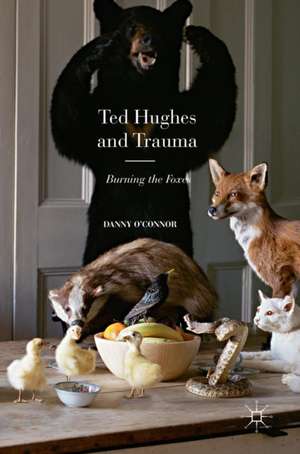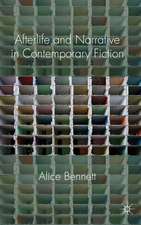Ted Hughes and Trauma: Burning the Foxes
Autor Danny O'Connoren Limba Engleză Hardback – 13 sep 2016
Covering a wide range of Hughes’ work, it explores the various traumas that define his writing. Whether it is comparing his idea of man as split from nature with that of Jacques Lacan, considering his challenging relationship with language in light of Roland Barthes and Jacques Derrida, seeing him in the art gallery and at the movies with Gilles Deleuze, or considering his troubled relationship with femininity in regard to Teresa Brennan and Slavoj Žižek, Burning the Foxes offers a fresh look at a familiar poet.
| Toate formatele și edițiile | Preț | Express |
|---|---|---|
| Paperback (1) | 447.84 lei 6-8 săpt. | |
| Palgrave Macmillan UK – 21 apr 2021 | 447.84 lei 6-8 săpt. | |
| Hardback (1) | 386.81 lei 6-8 săpt. | |
| Palgrave Macmillan UK – 13 sep 2016 | 386.81 lei 6-8 săpt. |
Preț: 386.81 lei
Nou
Puncte Express: 580
Preț estimativ în valută:
74.01€ • 77.49$ • 61.24£
74.01€ • 77.49$ • 61.24£
Carte tipărită la comandă
Livrare economică 05-19 aprilie
Preluare comenzi: 021 569.72.76
Specificații
ISBN-13: 9781137557919
ISBN-10: 1137557915
Pagini: 240
Ilustrații: VIII, 204 p.
Dimensiuni: 148 x 210 x 18 mm
Greutate: 0.39 kg
Ediția:1st ed. 2016
Editura: Palgrave Macmillan UK
Colecția Palgrave Macmillan
Locul publicării:London, United Kingdom
ISBN-10: 1137557915
Pagini: 240
Ilustrații: VIII, 204 p.
Dimensiuni: 148 x 210 x 18 mm
Greutate: 0.39 kg
Ediția:1st ed. 2016
Editura: Palgrave Macmillan UK
Colecția Palgrave Macmillan
Locul publicării:London, United Kingdom
Cuprins
Introduction. A tyrannical reading of Ted Hughes.- Chapter One. Hughes’s Creaturely Creatures.- Chapter Two. Hughes’s Landscape, Lacan’s Real.- Chapter Three. En Attendent Crow.- Chapter Four. Hughes meets Bacon, Baskin and the Big Screen.- Chapter Five.Hughes and War Trauma.- Chapter Six. Hughes and the Burning of Literary Criticism.- Chapter Seven.
‘She did life’.- Chapter Eight. Hughes, the Goddess and the Foundational Fantasy.- Conclusion. A New Classicism?.- Acknowledgments.- Bibliography.
Notă biografică
Danny O’Connor teaches at The University of Liverpool,UK. This is his first book.
Textul de pe ultima copertă
This book is a radical re-appraisal of the poetry of Ted Hughes, placing him in the context of continental theorists such as Jacques Lacan, Jacques Derrida and Slavoj Zizek to address the traumas of his work. As an undergraduate, Hughes was visited in his sleep by a burnt fox/man who left a bloody handprint on his essay, warning him of the dangers of literary criticism. Hereafter, criticism became ‘burning the foxes’. This book offers a defence of literary criticism, drawing Hughes’ poetry and prose into the network of theoretical work he dismissed as ‘the tyrant’s whisper’ by demonstrating a shared concern with trauma.
Covering a wide range of Hughes’ work, it explores the various traumas that define his writing. Whether it is comparing his idea of man as split from nature with that of Jacques Lacan, considering his challenging relationship with language in light of Roland Barthes and Jacques Derrida, seeing him in the art gallery and at the movies with Gilles Deleuze, or considering his troubled relationship with femininity in regard to Teresa Brennan and Slavoj Žižek, Burning the Foxes offers a fresh look at a familiar poet.
Covering a wide range of Hughes’ work, it explores the various traumas that define his writing. Whether it is comparing his idea of man as split from nature with that of Jacques Lacan, considering his challenging relationship with language in light of Roland Barthes and Jacques Derrida, seeing him in the art gallery and at the movies with Gilles Deleuze, or considering his troubled relationship with femininity in regard to Teresa Brennan and Slavoj Žižek, Burning the Foxes offers a fresh look at a familiar poet.
Caracteristici
Provides a in-depth reading of some of Hughes' most iconic works in relation to his literary criticism Offers an accessible analysis of Hughes' poetry Situates Hughes' canon within its historical moment while arguing for its future relevance















